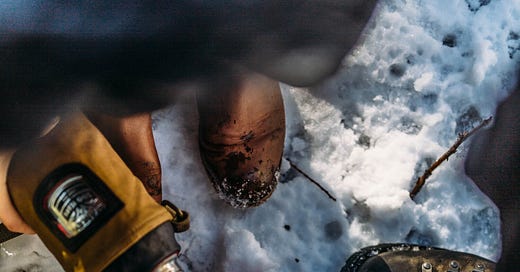Welcome to this week’s Saturday Stoke, a short inspirational podcast designed to encourage and challenge you on the path ahead—it’s a place where, if I’m doing my job right, I’m spurring us all on toward love and good deeds. It’s a podcast that feels like fresh snow on your fingertips and tastes like fresh apple pie.
Thanks for joining me. It’s been a couple of weeks since our last stoke together, but I have a good excuse. I’ve been sick for most of the Christmas and New Year’s holiday and spent New Year’s Eve sweating through a fever. But even winter sickness can’t douse my stoke. I’m thrilled to be with you today and hope you experienced the wonder of the Christmas miracle with your family and friends.
It’s 2020, and like you, I’m looking ahead and envisioning another year of life, of growing, of struggling, of loving, of failing, of overcoming. We experience it all don’t we, and eventually find our way to year’s end wondering what it all meant, what God was thinking, and what he wants for us on this new pathway of life.
St. Augustine said:
“And men go abroad to admire the heights of mountains, the mighty waves of the sea, the broad tides of rivers, the compass of the ocean, and the circuits of the stars, yet pass over the mystery of themselves without a thought.”
For me, the best way to remain stoked is to remember who I am in Christ and to remember that God knew me before I was born; he wove me together in some secret corner of eternity and has a unique plan for my life.
And so I say to you dear friends, to you, eager travellers—you there, the one with sunlight in your eye and a dream on your shoulder—when you head out on your journey this year don't get caught up with trying to catch those who've already left the safety of the shire. Don't copy them. You are not a mime. You are a frontiersman.
A frontiersman charts the stars, pays attention to the weather, and scouts the land for good water and high places for camp. The mime, on the other hand, travels with her head down, trying to step into the footprints of another. She doesn't see the traps ahead. She doesn't realize the land she's entered is not safe and she gets swallowed up.
So, here’s one of the golden rules of the frontiersman (and yes, I just made up that up): you are you—made for a certain path, one you must discover through living a life of faith. If you follow along someone else's path, you'll wind up lost or eaten.
No. Instead, take a moment and listen. What does that dream draped across your shoulder say? Does it whisper to you, “Take a step in this direction—you were made for so much more.”
Does it speak in the shadowy tones of the north, calling you out of that safe haven you’ve so carefully constructed all these years? Is it pushing you to the plains of the west, perhaps?
Where, oh traveller, will you go?
Me? I've set a course for the stars and raised my sails for what I like to call "the reaches." Yes, this course often drives my lovely wife nuts, but deep down, she loves the ride.
And, there’s always comfort in knowing that if I lose my way, at least I will be lost among the heavens where only the stars and planets survive. But that's just me.
Another one of my golden rules of the frontiersman is this: Don't become entrenched in the wild goose chase of what some refer to as "your calling." That is a frontiersman myth.
You know your calling. You hear it when you wake up in the morning, aching your eyes open over that cup of coffee. You've walked in its echo since you can remember climbing trees as a child. The calling never changes; it is God's purpose for you. And what is his purpose for you?
The Westminster Shorter Catechism reminds us that the chief end of man is to glorify God and enjoy him forever. I love that and I do my best to keep it front and centre in all my endeavours on the frontiers of life.
“But Tim, that kind of purpose is so nebulous, I need to work and make money, and live, and eat,” you say.
“Quite right,” I reply. “But eating and working originate not in food and toil, but in finding your strength and rest in God.”
This kind of overarching purpose grows as you grow. The bigger it grows, the stronger its pull.
This idea of “calling” is what scholars refer to as vocatio. It is what you are wired to do and often, it can be traced back to your very young years and it doesn’t always coincide with what you do in life to make a living. I wanted to be a writer since the sixth grade. I made up stories all the time, wrote songs, poems—it’s who I was, and who I’ve always been. I’m fortunate to make my living with my vocatio. But if it all went away tomorrow, and I had to landscape homes to eat and pay the mortgage, I would still be a writer.
The late philosopher Dallas Willard writes, "In many cases, our need to wonder about or be told what God wants in a certain situation is nothing short of a clear indication of how little we are engaged in His work.” If we're not tuned in to God's work but are more bent on your own ambition, then it's time to set a new bearing.
But perhaps you're just a bit scared. You know what that voice inside your head is telling you. You hear the echo, but you fear following the sound because it leads to a land with which you are not yet familiar.
Here’s a quick hack for finding your way out into God’s frontier of faith: Obedience.
"But Tim, can you get more specific. What, exactly, am I to obey?" you ask.
If it is still unclear, then you need to listen some more. In your listening, you need to focus on becoming still. Don't get sidetracked into the what. Focus on the who. You were called to be God's child. Nothing else. It's a matter of listening and obeying Him.
Begin each day by asking yourself: “How can you be all God's today?”
Obedience is the signature of our love for God and the mark of surrender. Even Jesus obeyed and his obedience, says Dallas Willard, “rested in his mature will and understanding of his life before God.” Jesus was so united with God that obedience came naturally for Him. His Father’s desires became his desires even to the point of death.
“But Tim, I feel like you are taking me to a very strange and unknown land. I live in the modern world. This idea of listening and becoming still, it’s all a bit too mystical for me?”
“Ah,” I reply, “But what could be more mystical than the invitation to follow a homeless vagabond into death?”
"If you want to follow Me," Jesus said, "then pick up your cross."
This calling is what makes you a frontiersman. And, the great irony of this unknown land is that to live in it allows you to be fully known. In this land, you can be at ease. This land allows you to hear the voice of God and to fall in love with it. In this land, God's voice becomes your desire.
Following Jesus is different than miming others. It won't always make the most sense. You will look around to see if others are following with you, and you will find no one.
Congratulations, you’ve made your way to God’s frontier of faith.
“The wind blows wherever it pleases,” writes John the Beloved. “You hear its sound, but you cannot tell where it comes from or where it is going. So it is with everyone born of the Spirit.”
What would it look like to follow the wind? Wind shifts without signal. Wind is invisible. Wind is powerful. Wind is haunting. The fiercest winds come with storms in tow—they thrive and build out in the wilderness plains. They live in the mountain heights and howl in tall pines.
Now imagine what a person following the wind must look like from a distance. Have you ever watched someone who was being attacked by a bee? They look insane, swatting at—what appears to you to be—nothing, and screaming and running. It's comical.
I wonder if Abraham looked like an insane bee-swatter when he left camp with Isaac after telling his servants that they were going to the mountain to worship. I'm sure he must have looked a bit deranged when he tied up his son and laid him upon an altar to be slaughtered.
I'm sure, if we were looking at Abraham from a distance, he would look like a killer as he lifted his knife to plunge it into Isaac—his only and special son.
We could go on, couldn't we? Perhaps the disciples called Jesus the insane bee-swatter as He confronted the religious officials with riddles and obscure stories. I'm sure He appeared to be a madman when He said He would tear down the temple and rebuild it in three days.
And what did He look like the masses and to his disciples when they were scourging Him? Was He the mad bee-swatter when they dropped the cross into its hole in the ground? What does a mad bee-swatter sound like when nails are pounded in His wrists and ankles?
Following this "Spirit" is madness. Isn't it?
But that would mean you and I are as well. And maybe that's what we’re afraid of—to be called a bee-swatter; a frontiersman; a honey-and-locust eating weirdo roaming the wilderness without any followers.
When I say that you and I are frontiersmen, I’m saying that we must display the courage it takes to go where no one else will go for the glory of God. Not for the provocation of it all, but because we have become professional wind chasers; we are full-time bee-swatters.
In all of this lies a quiet courage. And perhaps I’m writing this more for me than for any of you. I’m looking in the mirror and saying, “Brace yourself like a man. Be strong and courageous.”
Brace yourself. When I read that exchange between Jehovah and Job, I am cut to the core. For even though Job found success in his culture, when he began to question God he found himself out of place. In the ashes of pain and extreme loss, none of his success mattered anymore. He needed only to listen as God painted a picture of Himself.
What did that picture look like? In a word, brilliance. Don’t we all find ourselves in Job’s position? Success or failure, we lose sight or look right past God in all His glory. We are so great! Or we are so low? We, we, we. Me, me, me. When our focus rests on our temporal position as people, when we care more about gaining and losing, then we’ve stepped out of God’s brilliance and live not for his glory, but for our own.
And if we’re not careful we will slip into comfort and nonchalance, and we will stay home in the safety of base camp and save the frontier for another day.
I once camped on the shore of Lake Powell in Arizona. I stayed up till 2 a.m. with my brother-in-law, gazing at the myriad of stars and talking in hushed tones.
The starlight brilliance was overwhelming!
I woke the next morning just before dawn. I unzipped my tent and looked across the water. Seconds later the sun broke over the far ridge, gleaming off the water in a wash of red and orange brilliance. I never felt more alive. I wanted to run into the brilliance. I wanted the moment to extend into my whole day and into the next.
God is calling us to Himself, daily. We have the option to sleep in and let the sun rise unnoticed. Or, we can unzip our tent and head out into the brilliance of the frontier … into God and all His glory.
Stay stoked my friends.
Subscribe to The Saturday stoke Podcast
















Share this post